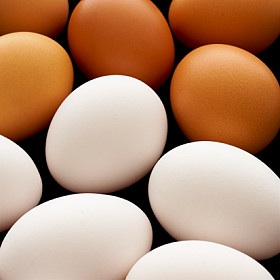Four myths about eggs…...
-

By Lori Bongiorno
Posted Tue May 4, 2010 12:09pm PDT
from The Conscious Consumer blogChoosing eggs is not nearly as simple as it should be. After all, the average egg weighs about 2 ounces. How many decisions can you possibly have to make for something so small and seemingly simple? Well, let’s see: Brown or white? Large or small? Organic or not?
And those decisions are just the tip of the iceberg. Egg cartons can be stamped with any number of labels, some meaningful, others not so much.
It's not always easy to separate fact from fiction when it comes to eggs. Below are some of the most common misconceptions.
Myth: Brown eggs are different than white.
Fact: The only difference between a brown and white egg is the color of the shell, which is merely a reflection of the breed of the hen. In general, but not always, hens with white feathers and earlobes lay white eggs and those with dark feathers and red earlobes lay brown eggs.
One isn’t healthier, more “natural,” or more eco-friendly than the other. There aren’t any differences in nutritional quality, flavor, or cooking characteristics.
Myth: Free-range eggs come from hens that roam freely outdoors.
Fact: The claims are not regulated for eggs, according to Consumer Reports. So there is no guarantee that the hen that laid the eggs ever saw the light of day. Of course, it may have spent time outdoors, but the “free range” label doesn’t mean anything. The following labels are also meaningless when it comes to eggs: “free roaming,” “hormone free,” and “raised without antibiotics.”
Myth: Organic eggs are healthier.
Fact: They certainly can be, but it all depends on the chicken’s diet. Organic eggs come from hens that are fed a 100-percent organic diet. However, what really matters when it comes to nutrition is whether the hens were raised on pasture. Studies, such as those conducted at Penn State University and by Mother Earth News, found that eggs from chickens that ate grass and insects contained higher levels of omega-3 fat, and vitamins E, A, and in some cases D.
If you want eggs from hens that are raised on pasture or spend a lot of time outdoors, then you’ll have to find a farmer you trust at your local farmers’ market.
Myth: Egg substitutes are simply eggs (or egg whites) without the shells.
_Fact:_Most products have added stabilizers, thickeners, vitamins, carotenes, and, sometimes, spices, according to Marion Nestle, author of What to Eat. She also points out that they cost about twice as much as real eggs. (A pound of egg substitutes weighs slightly less than a dozen small eggs.)
Of course, if you can’t eat egg yolks for health reasons or have no use for them, egg substitutes are a good option, and most products only have a tiny percentage of additives. Just read the labels before buying.
Environmental journalist Lori Bongiorno shares green-living tips and product reviews with Yahoo! Green's users. Send Lori a question or suggestion for potential use in a future column. Her book, Green Greener Greenest: A Practical Guide to Making Eco-smart Choices a Part of Your Life is available on Yahoo! Shopping and Amazon.com.
-
Brandon reads this while eating 3 scrambled non-free range eggs for breakfast!…lol
-
In theory, there should be no difference between brown & white eggs, but when I visit the farms where the brown eggs are produced, at least here in Michigan, the chickens are out in the yard, scratching in the dirt and eating kitchen scraps like carrot peelings etc. So from my experience brown eggs are probably more nutritious.
It is unfortunate indeed that terms like 'free range' mean nothing, because when I give presentations on farm animal cruelty people start off making fun and by the time they're done watching the videos they don't even want to think about it the next time they eat a pork chop or steak or egg. There is nothing funny about a hen wired to her nest, never getting up from it for her entire life; with her upper beak painfully torn off and birth so the "farmers" can shove seed in faster to produce more eggs. Male chicks often "useless" depending on the farms goals, are ground up alive. The fact is we don't need any animal products to live and there is plenty of evidence we are healthier without them. But realizing that people will not give up meat or whatever, I just ask: can it least be produced as cruelty free as possible?
